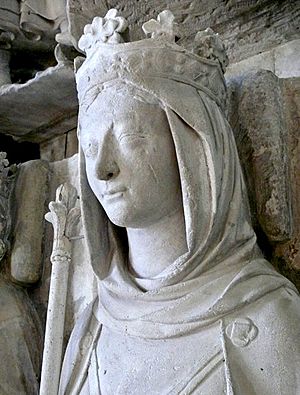Ermentrude of Orléans facts for kids
Quick facts for kids Ermentrude |
|
|---|---|

Ermentrude
|
|
| Queen consort of West Francia | |
| Tenure | 843–869 |
| Coronation | 866 |
| Born | 27 September 823 |
| Died | 6 October 869 (aged 46) |
| Burial | Basilica of Saint-Denis, Paris, France |
| Spouse | Charles II (m. 842) |
| Issue among others... |
|
| Dynasty | Udalriching |
| Father | Odo I of Orléans |
| Mother | Engeltrude de Fézensac |
Ermentrude of Orléans (born September 27, 823 – died October 6, 869) was an important queen in early French history. She became the Queen of the Franks when she married Charles II, who was a powerful king.
The Role of a Queen
In Ermentrude's time, queens were seen as a king's "helpmate." This meant they helped the king and were expected to have children to continue the royal family. They had a lot of power within the royal household and at court.
Historians like P. Stafford have studied the role of queens, often looking at Ermentrude's life. Queens were in charge of the daily running of the royal home. They managed the royal money and made sure the children received a good education. Queens also hosted important guests and gave gifts to high-ranking officials. This was a way to keep strong friendships and alliances in society. Because of these duties, queens were expected to be loyal, wise, and behave well.
A writer from Ermentrude's time, John Scotus Eriugena, called her a 'strong woman.' We know she was involved in royal business because two letters were written in her name, and five more were sent to her. She was also part of 12 official documents issued by King Charles II.
Her Coronation as Queen
In 866, Ermentrude had a special ceremony called a consecration. This was done by Archbishop Hincmar of Rheims. It was a politically difficult time for the king and the archbishop. What was unusual is that Ermentrude was crowned more than 20 years after she married the king.
According to historian Z. Mistry, this coronation showed two key ideas about queens:
- It helped make the royal family's future more secure.
- It showed what it meant to be a good wife to a king.
During the ceremony, Ermentrude was often compared to Sarah from the Bible. Sarah struggled to have children until she showed strong faith. This comparison was meant to bless the royal family with more children through Ermentrude. It also showed that having children and keeping the family line going was linked to being very religious. Ermentrude herself was interested in religious places and had connections with several convents, like Chelles and Avenay.
Archbishop Hincmar also set out ideas for how queens should act. He expected Ermentrude to be 'loveable like Rachel, wise like Rebecca, and loyal like Sarah.' These qualities were often expected of queens in the Carolingian era. Eriugena also praised Ermentrude for being pure, religious, and always praying, which were seen as good qualities like those of women in the Bible.
Family and Children
Ermentrude of Orléans married Charles II, also known as "The Bald," in 842. They had many children together:
- Judith (born around 843) was a queen in Wessex and later a countess in Flanders through her marriages.
- Louis II of West Francia (846–879) later became king.
- Charles I of Aquitaine (847–866) was also known as "The Child."
- Lothar (848–865) became a monk and later an abbot.
- Carloman (849–876).
- Rotrud (852–912) became a nun.
- Ermentrud (854–877) also became a nun.
- Hildegard (born 856).
- Gisela (857–874).
- Godehilde (864–907).
Images for kids
See also
 In Spanish: Ermentrudis de Orleans para niños
In Spanish: Ermentrudis de Orleans para niños
 | Bessie Coleman |
 | Spann Watson |
 | Jill E. Brown |
 | Sherman W. White |


